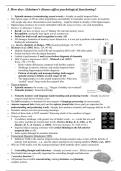3. How does Alzheimer's disease affect psychological functioning?
1. Episodic memory (remembering recent events) - Atrophy in medial temporal lobes
o The earliest signs of AD are often forgetfulness and inability to remember recent events. In moderate
AD, people also show disorientation and wandering – might be linked to atrophy of the hippocampus.
o Hippocampus (memory for events) embedded within the temporal lobes, one each hemisphere.
o Memory in Alzheimer’s disease
Recall: you have to find a way of ‘finding’ the relevant memory traces
Recognition: seeing the item again acts as a potent cue
Deficit for both recall and recognition in early AD
AD damages formation of memory traces themselves; it is not just a problem with retrieval (i.e.,
finding the information)
e.g., Greene, Baddeley & Hodges, 1996, Neuropsychologia, 34, 537-551
o Backman et al. (2001) Brain, 124, 96-102
Method: Repeated free recall (FR) and recognition (RN) with >100 older adults
Picked out those who developed dementia
Looked at performance 3 and 6 years before diagnosis of dementia
Mild Cognitive Impairment (MCI) - Whitwell et al. (2007)
Brain, 130, 1777-86.
- Brain volume differences compared with healthy controls.
- Shrinkage in anterior, inferior, and medial temporal lobes
(including hippocampus) before diagnosis.
- Pattern of atrophy and neuropsychology both suggest
episodic memory deficits at early stages of AD
- The hippocampus is in the medial temporal lobe. What does
“medial” mean? Deep inside the temporal lobe
o Types of memory
Episodic memory for events: e.g., “Megan’s birthday last weekend”
Semantic memory: factual knowledge
2. Semantic memory and language (understanding and producing words) - Atrophy in anterior
temporal and inferior frontal cortex
o The left hemisphere is dominant for most aspects of language processing (in most people).
o Anterior temporal lobe (front part) and the inferior frontal lobe (lower part) are important for
understanding and producing words. Atrophy here produces semantic and language deficits in AD.
o Semantic memory involves processing meanings.
o Which of these tasks is NOT semantic? Knowing which of two numbers is bigger
o Category fluency task
Vocabulary shrinkage, with greater loss of harder words – i.e., words that are used
less often, and that are learned later in life. [Forbes-McKay, K. E., Ellis, A. W.,
Shanks, M. F., & Venneri, A. (2005). Neuropsychologia, 43, 1625-1632.]
Impaired object naming correlates with cortical thinning in the left anterior
temporal lobe in AD.
Same region damaged in semantic dementia
o Transcranial Magnetic Stimulation (TMS)
Inhibitory TMS to the anterior temporal lobes disrupt semantic tasks, in line with the deficits of
patients with dementia – e.g., specific object naming but not reasing numbers (Pobric et al., 2007)
o Why are TMS studies a bit like neuropsychology? Both methods allow causal conclusions
3. Controlling thought and behaviour - Atrophy in frontal cortex - Effects on personality
o The frontal lobes are especially important for controlling thought and behaviour
(“executive function”).
o AD patients have trouble concentrating, making decisions, and planning
complex actions.




